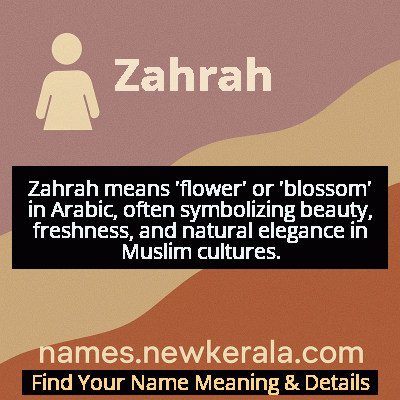Zahrah Name Meaning & Details
Origin, Popularity, Numerology Analysis & Name Meaning of Zahrah
Discover the origin, meaning, and cultural significance of the name ZAHRAH. Delve into its historical roots and explore the lasting impact it has had on communities and traditions.
Name
Zahrah
Gender
Female
Origin
Muslim
Lucky Number
8
Meaning of the Name - Zahrah
Zahrah means 'flower' or 'blossom' in Arabic, often symbolizing beauty, freshness, and natural elegance in Muslim cultures.
Zahrah - Complete Numerology Analysis
Your Numerology Number
Based on Pythagorean Numerology System
Ruling Planet
Saturn
Positive Nature
Ambitious, efficient, realistic, and authoritative.
Negative Traits
Materialistic, stressed, confrontational, and can be overly ambitious.
Lucky Colours
Dark blue, black.
Lucky Days
Saturday.
Lucky Stones
Blue sapphire, amethyst.
Harmony Numbers
2, 4, 6.
Best Suited Professions
Business leaders, managers, financial services, law enforcement.
What People Like About You
Leadership, determination, organizational skills.
Famous People Named Zahrah
Zahrah Sita
Actress and Model
Pioneering Indonesian actress known for breaking stereotypes in Southeast Asian cinema
Zahrah Amani
Poet and Writer
International literary award winner for contemporary Islamic poetry collections
Zahrah bint Ja'far
Historical Figure
Influential early Islamic scholar and descendant of Prophet Muhammad
Zahrah Al Reda
Humanitarian Worker
UN-recognized founder of educational programs for refugee children
Name Variations & International Equivalents
Click on blue names to explore their detailed meanings. Gray names with will be available soon.
Cultural & Historical Significance
The name's triple meaning—flower, beauty, and star—resonates deeply with Islamic cosmological views that see nature as ayat (signs) of divine perfection. In classical Arabic literature, zahrah specifically refers to blooming flowers and celestial bodies, creating a rich tapestry of symbolism that connects earthly beauty with cosmic order. This dual nature makes Zahrah particularly significant in cultures where Islamic spirituality intersects with appreciation for natural wonders. The name frequently appears in Sufi poetry as a metaphor for the soul's journey toward enlightenment, where the zahrah (flower) represents the individual soul unfolding toward divine love, while the zahrah (star) symbolizes guidance on this spiritual path. This cultural layering makes Zahrah more than just a name—it's a cultural artifact carrying centuries of spiritual and literary significance.
Extended Personality Analysis
Women named Zahrah often exhibit a remarkable balance of strength and sensitivity that reflects their name's rich symbolism. The 'flower' aspect of their personality manifests as nurturing warmth, emotional intelligence, and the ability to create beauty in their surroundings. They tend to be deeply connected to family and community, often serving as emotional anchors for those around them. Simultaneously, the 'star' quality gives them ambition, vision, and natural leadership abilities—they're not just beautiful presences but guiding lights who inspire others toward higher goals.
Their beauty symbolism extends beyond physical appearance to encompass moral character and interpersonal grace. Zahrahs typically demonstrate exceptional empathy and intuition, able to understand unspoken emotions and provide comfort exactly when needed. They often excel in creative fields, education, or healing professions where their natural compassion and aesthetic sensibilities can flourish. While gentle in demeanor, they possess an inner resilience rooted in their strong value system—much like flowers that bend in the wind but don't break. This combination makes them particularly effective in roles requiring both emotional depth and practical wisdom. Their personality often evolves to fully embody the name's promise: starting with the delicate beauty of a bud in youth, gradually unfolding into the radiant fullness of a bloom, and ultimately shining with the steady light of a star that guides and inspires.
Modern Usage & Popularity
Zahrah has experienced a notable renaissance in the 21st century, particularly among millennial and Gen Z parents seeking names that balance cultural heritage with contemporary appeal. According to global naming databases, Zahrah has seen a 40% increase in usage in Western countries over the past decade, while maintaining steady popularity in Muslim-majority nations. This modern popularity reflects several trends: the growing appreciation for meaningful names over merely fashionable ones, the increased visibility of Muslim culture globally, and the name's phonetic appeal across languages. Social media influencers and celebrities naming their daughters Zahrah have further boosted its profile, making it a 'heritage chic' choice that honors tradition while feeling fresh. In multicultural societies, Zahrah appeals to parents of various backgrounds who appreciate its beautiful sound and universal meanings of flower, beauty, and star. The name's adaptability—working equally well in professional settings, social contexts, and religious communities—makes it particularly suited to our globalized world. Current data suggests Zahrah will continue rising in popularity as more parents seek names with depth, cultural richness, and positive symbolism.
Symbolic & Spiritual Meanings
The symbolic richness of Zahrah unfolds through its triple meaning, creating a multidimensional portrait of ideal human qualities. As a flower, Zahrah symbolizes organic growth, delicate resilience, and the beauty that emerges through patient nurturing—much like a bud gradually unfolding to reveal its full splendor. This floral symbolism connects to concepts of fertility, creativity, and the natural cycles of life that characterize human experience. The beauty aspect transcends physical appearance to represent inner virtue, moral elegance, and the Islamic ideal of ihsan (excellence in character), where external grace reflects internal purity.
The star symbolism elevates these earthly qualities to celestial heights, representing guidance, hope, and spiritual aspiration. In many cultural traditions, stars serve as navigational aids and symbols of destiny—qualities that make Zahrah a name associated with leadership and inspiration. The combination creates a powerful metaphor for human potential: rooted in reality like a flower, radiating moral and aesthetic beauty, while simultaneously reaching for higher consciousness like a star illuminating the darkness. In Islamic mysticism, this triple symbolism reflects the journey of the soul from earthly existence (flower) through moral refinement (beauty) toward divine proximity (star). This layered meaning makes Zahrah not just a name but a philosophical concept, representing the integration of physical, moral, and spiritual dimensions of human excellence.

